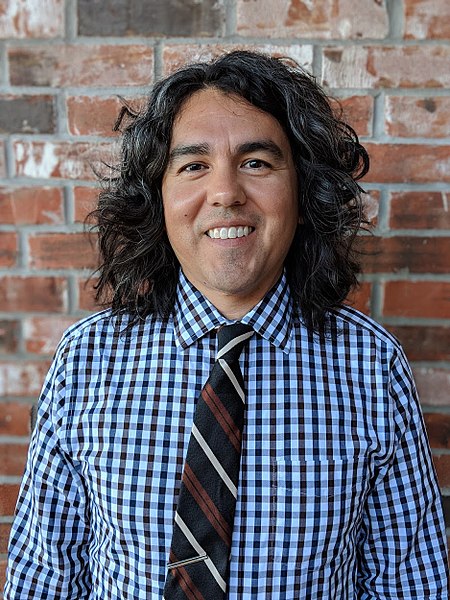Dr. Michael Ramirez is Associate Professor of Sociology at Texas A&M University-Corpus Christi. He participated in our Wikipedia Fellows pilot this spring as a member of the American Sociological Association, one of the three associations that collaborated with us in this pilot. Here, Dr. Ramirez reflects on the opportunities that Wikipedia presents for public sociology.

Image: File:Michael ramirez headshot.jpg, Michaelramirez, CC BY-SA 4.0, via Wikimedia Commons.
I have a confession to make. I wasn’t exactly Wikipedia’s strongest advocate before starting the Wikipedia Fellows pilot. Without having done much investigation on Wikipedia, I simply privileged those anecdotal or unsubstantiated claims that Wikipedia wasn’t “real” knowledge. Or that it didn’t include “real” sociology. Or that there was no guarantee the information on the articles were reliable. I’ve known and heard of professors who despised Wikipedia and outlawed using it for any class purposes (and honestly I’ve been that professor too). I get it. Some students use Wikipedia as a shortcut for doing deep reading and/or for doing “real” research for courses.
However, my participation in the Wikipedia Fellows pilot pulled back the curtain to the reality of Wikipedia. And I came to realize that Wikipedia is a goldmine that we have yet to harness for helping our discipline disseminate the important knowledge sociology generates. I also came to appreciate that Wikipedia is one of many tools that our students can use to learn about the world in which they live – which ultimately is one of the central goals of any liberal arts education.
As academics, we sometimes roll our eyes at Wikipedia – we have embraced the (largely inaccurate) charge that Wikipedia is flawed information and the antithesis of academic rigor. However, like any good sociologist, I investigated the workings, norms, and practices of Wikipedia and I have learned three things.
1. Wikipedia is a tool that we are not using to our discipline’s advantage.
Wikipedia is an asset that we are simply not harnessing for the benefit of our discipline. The charge that it is filled with wrong information is simply inaccurate. My time exploring Wikipedia has indicated that the main limitation of it is that sociological perspectives are often missing. This of course is not the fault of Wikipedia. This omission is rather the responsibility of our academic discipline. Wikipedia is a publically accessible venue to which we are not contributing our work – the reality is that people seek out knowledge on Wikipedia.
2. As academics, it should be our responsibility to use, review, and most importantly contribute to Wikipedia articles on which sociology has generated important scholarship.
We are the “experts” and as such, we should use our expertise for the greater good. Sociological perspectives are far too often overlooked in the creation of knowledge and understanding of world issues. We can partly remedy this situation by actively incorporating our knowledge into public venues such as Wikipedia. We are not always our best advocates for moving our knowledge into the public domain. Wikipedia is a simple, yet powerful, opportunity to do so.
3. Wikipedia is an avenue for public sociology.
I unfortunately don’t have the time to engage in activism (in the traditional sense) at this point in my life and career. However, I see writing for Wikipedia as a form of public sociology and filling my drive for community engagement. I spent most of my time in the pilot working on Wikipedia’s masculinity article. During the spring of 2018, the number of readers of the article was well over 900 each day. I couldn’t believe it. You can do the math yourself, but this is leaps and bounds above the number of students most of us have access to during a typical semester.
I honestly had no idea that masculinity was a concept that hundreds upon hundreds of people investigated each day. But this really shouldn’t have come as a surprise to me. People crave information. People are lifelong learners. Sometimes learning is as simple – and as accessible – as looking up an article on Wikipedia. I am more and more compelled to see it as sociologists’ duty to put our knowledge out into the public for the largest audience possible.
To see the Wikipedia articles this Fellows cohort improved, click here. To learn more about how you can get involved as a Wikipedia Fellow, click here.

Thanks so much for your insights, and for your work on Wikipedia. I totally agree with you that sociologists have a professional obligation to work on Wikipedia. I also embrace the concept that working on Wikipedia is practicing public sociology.
Michael,
Very well stated! I found myself to be in a very similar position as you. I really enjoyed learning about the process and practices of Wikipedia and I have a new appreciate for what this might mean for my teaching and public engagement moving forward. Looking forward to reading more!